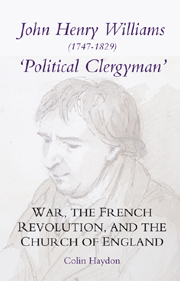 John Henry Williams (1747–1829): 'Political Clergyman'
John Henry Williams (1747–1829): 'Political Clergyman' Book contents
- Frontmatter
- Contents
- Dedication
- Illustrations
- Preface and Acknowledgements
- Abbreviations
- Editorial Note
- 1 The Grave and the Memory
- 2 The Formative Years
- 3 The Ivy-mantled Tow'r: Parish and Pastoralia
- 4 The Gathering Storm
- 5 By Far the Heaviest of All Earthly Calamities: Williams' Anti-War Sermons
- 6 Anxiety, the 1797 Campaign, and Afterwards
- 7 Assessment
- Bibliography
- Index
- STUDIES IN MODERN BRITISH RELIGIOUS HISTORY
2 - The Formative Years
Published online by Cambridge University Press: 12 September 2012
- Frontmatter
- Contents
- Dedication
- Illustrations
- Preface and Acknowledgements
- Abbreviations
- Editorial Note
- 1 The Grave and the Memory
- 2 The Formative Years
- 3 The Ivy-mantled Tow'r: Parish and Pastoralia
- 4 The Gathering Storm
- 5 By Far the Heaviest of All Earthly Calamities: Williams' Anti-War Sermons
- 6 Anxiety, the 1797 Campaign, and Afterwards
- 7 Assessment
- Bibliography
- Index
- STUDIES IN MODERN BRITISH RELIGIOUS HISTORY
Summary
Family and Early Life
On 10 April 1747, John Henry Williams, the son of John and Mary Williams, was baptized in Gloucester cathedral. As an adult, he would carefully commemorate the day on which he had received the sacrament admitting him to the body of Christ's church. That the infant was christened in the splendid medieval cathedral which dominated the city of Gloucester, and not merely in his parents’ parish church, was a mark of honour in a society wedded to conceptions and expressions of hierarchy. For John Williams was a prominent citizen of Gloucester and a scion of a proud, distinguished family.
The antiquarian county histories of the eighteenth century reflect the consuming interest of élite families in their lineage, the descent of manors, and their ancestors’ memorials; and those which treated the Williams family, notably Samuel Rudder's A New History of Gloucestershire (1779), were no exceptions. The founder of the Williams family's fortunes was the distinguished judge Sir David Williams (1550–1613). The son of a yeoman of Ystradfellte, Brecknockshire, he was admitted to the Middle Temple in 1568, called to the bar in 1576, and thereafter practised chiefly in south Wales. From 1581 to 1604, Williams was recorder of Brecon, from 1584 to 1598, he was MP for the Brecon boroughs, and, in 1604, he became a puisne justice of the King's Bench. Knighted in 1603, he was now a rich man – ‘a man of great living and personall wealthe’ – with large states in Wales and lands in Berkshire and Oxfordshire.
- Type
- Chapter
- Information
- John Henry Williams (1747–1829): 'Political Clergyman'War, the French Revolution, and the Church of England, pp. 18 - 36Publisher: Boydell & BrewerPrint publication year: 2007
